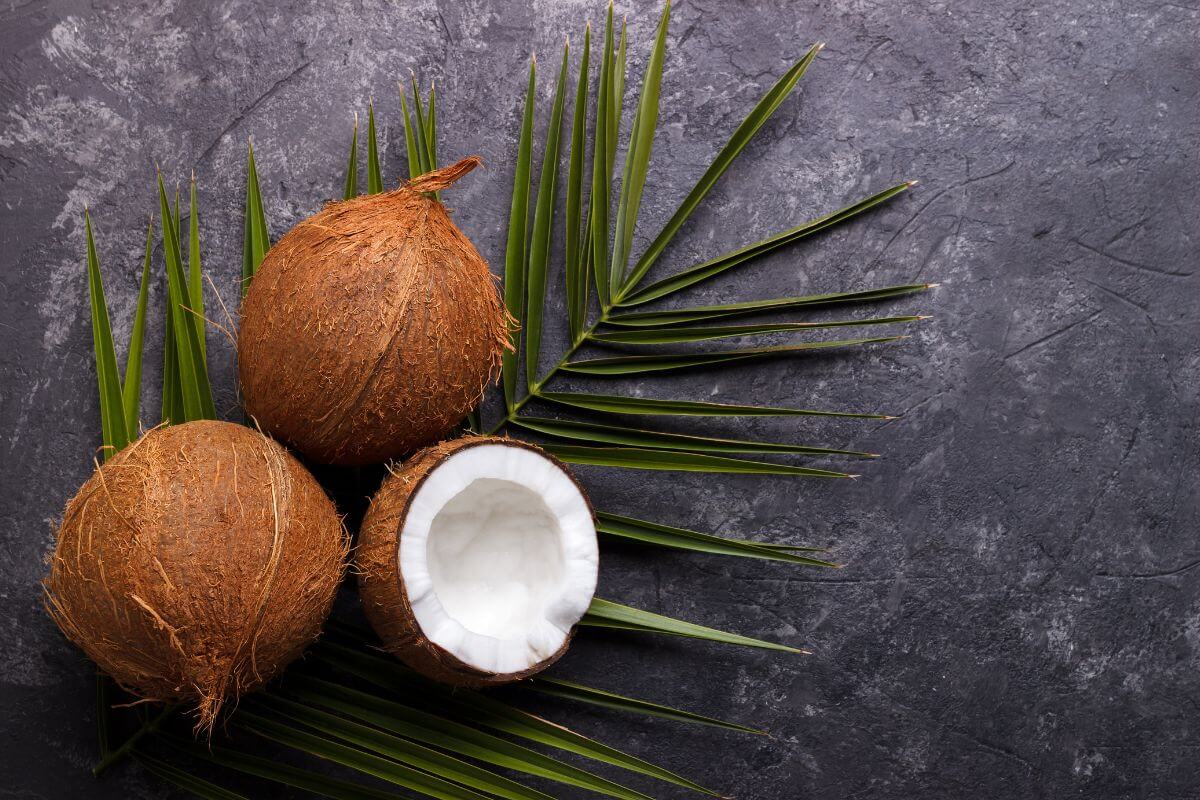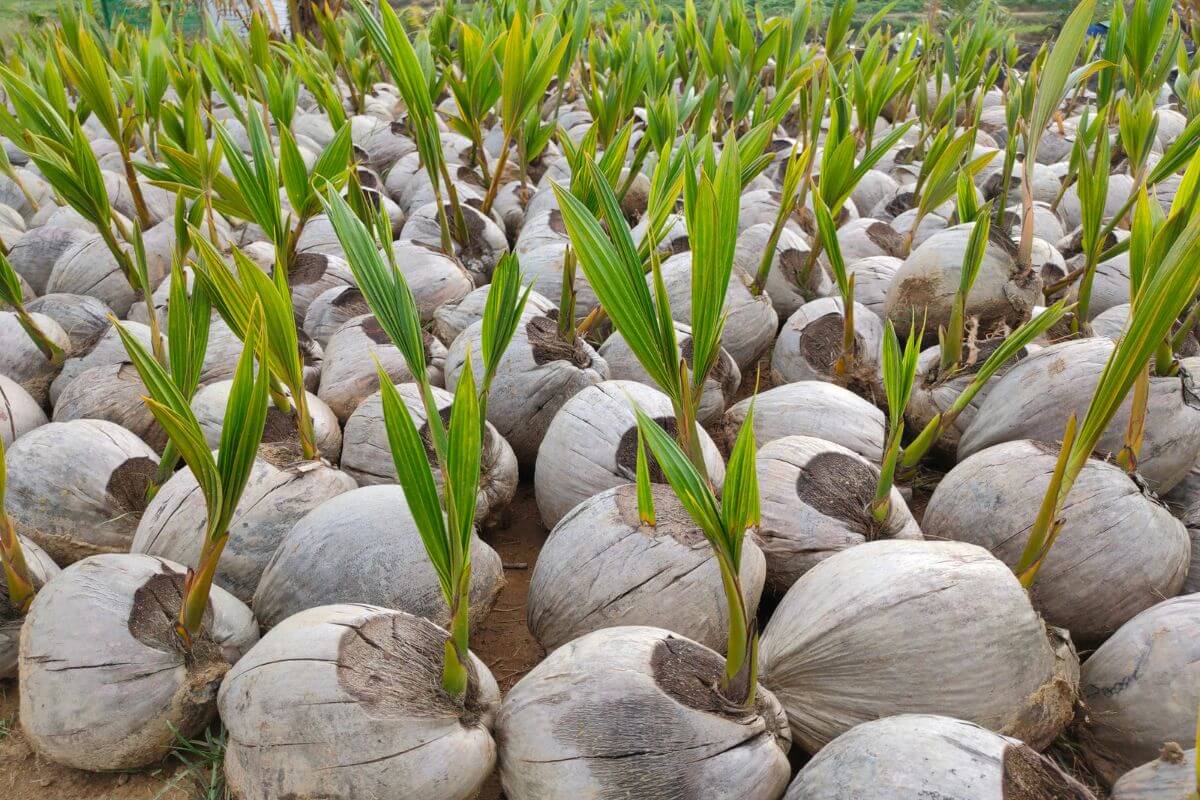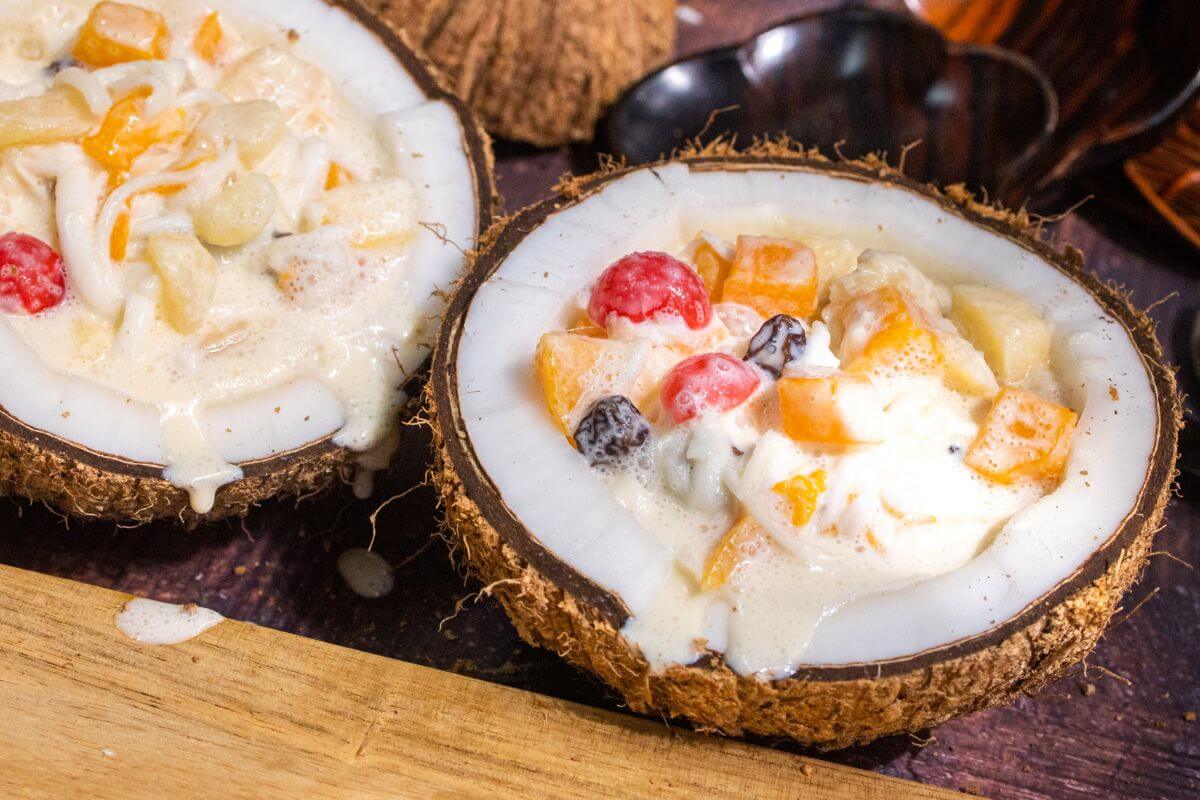Have you ever wondered if a coconut is a fruit or a vegetable? It’s a question that puzzles many, especially given its unique characteristics. Let’s dive into the botanical facts to clear up this common confusion.
I’ll explore how coconuts fit into the world of fruits and nuts, and why they sometimes get mistaken for vegetables. You’ll learn about their classification, how they’re used in cooking, and even their health benefits.
Are you curious to know more about this versatile food? Keep reading to discover the surprising truth about coconuts and how they can fit into your diet and lifestyle.
- Related article: Fruits and Vegetables Differences
5 Key Takeaways on Is Coconut a Fruit or Vegetable
- Coconuts are fruits. They are specifically one-seeded drupes or stone fruits. Drupes have three parts: the exocarp (hard shell), the mesocarp (fleshy middle layer), and the endocarp (hard stony layer protecting the seed). The hairy brown part we eat is the seed inside the fruit.
- In cooking, coconuts can be fruits, nuts, or vegetables. Their classification depends on the context. But botanically, they are drupes.
- Even though “nut” is in their name, coconuts are not true nuts. True nuts, like acorns, do not open to release their seeds. Coconuts sprout on their own. They also lack some proteins that cause nut allergies, making them safe for many with nut allergies.
- A coconut is also a seed. It helps the coconut tree reproduce. The white, fleshy part we eat is the endosperm. It nourishes the seed so the plant can start growing.
Is Coconut a Fruit or a Vegetable?

You might wonder if a coconut is a fruit or a vegetable. Well, it’s actually a fruit, specifically a one-seeded drupe or stone fruit. Fruits are the reproductive parts of a plant’s flowers. They include ripened ovaries, seeds, and surrounding tissue. The hairy brown center we eat is the seed inside the fruit. But palm trees, including coconut palms, are not true trees.
Drupes are one of nine fruit subgroups. They have a fleshy part covered by a hard outer layer with a seed inside.
A drupe has three layers, namely:
- The exocarp, which is the hard shell.
- The mesocarp, which is the fleshy middle layer.
- The endocarp, which is the hard stony layer protecting the seed.
Other examples of drupes are almonds, cherries, mangos, peaches, and plums.
In cooking, coconuts can be fruits, nuts, or vegetables. Some people call them fruits, others call them drupes or nuts. One person noted that botanical classifications don’t matter much in cooking. Coconuts can be used in many ways.
So, depending on the context, coconuts can be seen differently. Botanically, they are drupes. In cooking, they are often fruits or nuts.
Coconuts Are Nuts Explained
Many think coconuts are nuts because of the word “nut” in their name. But they are not. Nuts are a type of fruit because they are closed seeds.
Coconuts can be called loosely as nuts because they are one-seeded fruits. So, coconuts are both fruits and nuts.
But there is a difference. An acorn, a true nut, does not open to release its seed. The seed comes out when the shell decays or an animal eats it. Coconuts are different because they sprout on their own.
Coconuts are like nuts in some ways. They are tree nuts. But they lack some proteins that cause nut allergies. People allergic to almonds, hazelnuts, walnuts, pistachios, or cashews might eat coconut without problems.
The FDA website still lists coconut as a tree nut allergen. If you have tree nut allergies, ask your doctor before eating coconut.
Some places, like Australia, do not call coconut a tree nut. Allergy labels differ. Some products list coconut in tree nut warnings. Others list specific tree nuts.
Allergy experiences vary. Some people are allergic to both tree nuts and coconuts. Others are allergic to one but not the other. Allergy tests, like skin tests, may not always predict reactions to coconut.
People with allergies should read ingredient lists and talk to healthcare professionals. This helps them know their allergens and decide if they can eat products with coconut or tree nuts.
Coconuts Seeds Are Seeds Explained

A coconut is a seed because it helps the coconut tree reproduce. The coconut seed is like a baby plant.
When you look at a coconut, you’ll see three dark spots called “eyes.” After the seed germinates, one of these eyes will sprout, showing that the coconut is a seed.
The white, fleshy part we eat is called the endosperm. It nourishes the seed so the plant can start growing.
What Are the Health Benefits of Coconut?

Coconut offers several potential health benefits that make it worth adding to your cuisine and diet.
1. Coconuts May Help Fight Bacteria and Boost the Immune System
Some studies suggest coconut oil might stop certain bacteria from growing (source).
Researchers found it can block Staphylococcus aureus, a cause of staph infections. Another study showed brushing teeth with coconut oil reduced Streptococcus mutans, which is associated with dental caries (source).
In a test tube, coconut oil worked against Staphylococcus epidermidis and Escherichia coli, both of which cause foodborne infections (source).
While there’s evidence of coconut oil’s benefits, we need more research to fully understand its effects on bacteria and health.
Coconut water boosts your immune system because it contains a lot of lauric acid. Lauric acid fights viruses, bacteria, and fungi. It helps your body get rid of harmful bacteria.
2. Coconuts May Aid in Blood Sugar Management
Coconut helps control blood sugar because it is low in carbs and high in fat and fiber.
Studies show coconut oil may lower blood sugar due to its antioxidants and anti-inflammatory properties (source). The fiber in coconuts can also help with insulin resistance.
Coconut water does not have a big impact on blood sugar. However, drinking too much can raise potassium levels. The effect of coconut water on blood sugar can differ for each person, so you should monitor your response.
Animal studies suggest mature coconut water might lower blood sugar and hemoglobin A1C levels. But more research is needed. Choose unsweetened coconut water and limit it to 1–2 cups (240–480 ml) per day.
3. Coconuts May Protect Cells from Damage
Coconut is rich in antioxidants that protect your cells from damage caused by free radicals. These antioxidants come from phenolic compounds in the coconut flesh.
Studies show that these compounds neutralize free radicals and help prevent chronic diseases.
One cup of fresh coconut gives you 52% of your daily manganese needs (source). Manganese helps enzymes work in your body and reduces oxidative stress. Coconut also has selenium, another antioxidant that protects your cells from free radicals.
4. Coconuts May Improve Heart Health in Some People
Coconut oil is often called heart-healthy even though it’s high in fat. This is because it can raise HDL (the “good” cholesterol) and contains medium-chain triglycerides. Most plant-based oils have long-chain triglycerides.
But there’s not enough proof that coconut oil is truly healthy. A small 2015 study showed people with coronary artery disease lost weight and had higher HDL when they added extra-virgin coconut oil to their diet. Yet, other studies found it also raised LDL levels. So, we don’t know its full impact on blood lipids or future heart problems.
A 2020 review found that virgin coconut oil slightly increased HDL and lowered LDL compared to animal fats (source). However, more research is needed to understand its role in heart health.
5. Coconuts May Help Improve Your Skin
You might find coconut oil works well as a moisturizer. But it’s not for everyone. Some people say it clogs their pores and causes breakouts. Others love using it on their skin and hair.
Think about your skin type and sensitivity. Also, watch out for allergies. If coconut oil doesn’t suit you, try almond oil, jojoba oil, or grapeseed oil. These might be less likely to clog pores.
It’s smart to talk to a dermatologist or skincare expert for advice that fits you.
6. Coconuts Hydrate the Body
Coconuts are unique because they have a lot of water. People drink the water from unripe coconuts. As coconuts ripen, their water content decreases.
Coconut is rich in minerals like potassium, copper, and manganese. It helps replenish minerals lost through vomiting, diarrhea, or exercise.
Some people find coconut water helpful for rehydration after illness. It’s best to get nutrition from whole foods rather than relying on liquids. Drinking coconut water occasionally with a meal or when needed can be enjoyable and refreshing.
How to Add Coconut to Your Diet

Coconuts offer many versatile products that fit well into your daily diet. They add flavor, nutrition, and variety. Here are some tasty ways to use coconuts in your meals:
- Shaved or Flaked Coconut – Adds flavor and texture to stews, curries, rice dishes, and breaded shrimp. Check for added sugar in commercial brands if you want less sweetness.
- Baked Goods – Coconut improves cakes, cookies, and pies with sweetness and moisture. Sprinkle raw coconut on oatmeal, pudding, or yogurt for extra flavor.
- Coconut Flour – A gluten-free option perfect for those with wheat intolerance or celiac disease. Adds natural sweetness to cupcakes and other baked goods.
- Coconut Oil – Substitute for other cooking oils in baking, roasting, or sautéing. Rich in healthy fats and can aid in weight loss when used in moderation.
- Coconut Milk and Water – Great alternatives for those with lactose intolerance. Coconut milk can be used in smoothies, shakes, soups, and creamy gravies. Coconut water is a refreshing electrolyte drink, perfect for hydration post-workout.
- Fresh Coconut – Enjoy as a snack, in fruit salads, or grated on green salads.
- Coconut Chutney – A tasty addition to meals that helps with digestion and eases constipation.
- Dried Coconut Flakes – Used as a topping for cakes, pastries, granola, or smoothies for a crunchy texture.
- Coconut Ladoo – Delicious festival treats that incorporate coconut into your diet.
- Desserts and Shakes – Grated coconut improves the flavor of desserts like kheer, fruit custard, and shakes like mango or banana.
- Vegetables and Curries – Garnish vegetables or add to curries for extra taste and thickness.
- Coconut Butter – Made from freshly shredded coconut, great on toast, grilled fish, or chicken.
Is Coconut a Fruit or Vegetable? Final Thoughts
The coconut is classified as a fruit and a nut (loosely defined), because of its botanical properties as a seed.
Coconut is an excellent source of healthy fats, vitamins, minerals, and nutrients. It provides many health benefits, but should not be consumed in large quantities.
Is Coconut a Fruit or Vegetable FAQs
1. Why Is Coconut a Fruit?
Coconuts are fruits because they form the reproductive part of a flowering plant. Specifically, they are considered a one-seeded drupe or stone fruit.
2. Is Coconut a Berry?
A coconut is a drupe, not a berry. A berry is defined as a simple, fleshy fruit that has many seeds.
3. Is a Coconut a Nut?
Based on the loose definition that nuts are one-seeded fruits, we can consider coconuts as nuts.
For other foods that you’re wondering whether they are fruit or vegetable, check these articles out:

